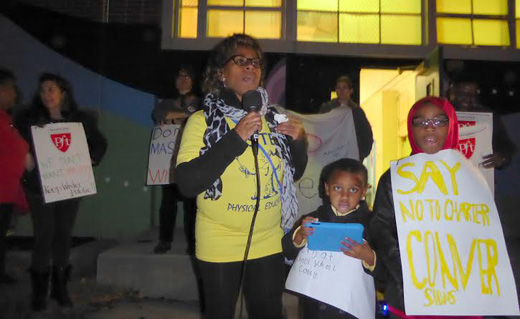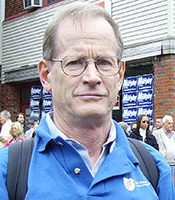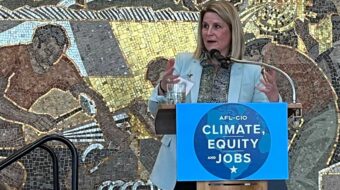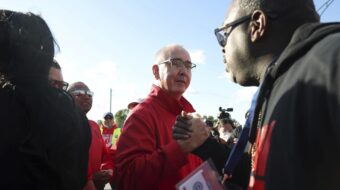
PHILADELPHIA – The fight to save and improve this city’s public schools has a long history. It has sometimes been fought one school at a time, and the parents and teachers at the Wister Elementary School in Philly’s Germantown neighborhood have recently found themselves on the front lines.
Over the last fifteen years, the system has been the target of attacks from the state legislature in Harrisburg, from previous Republican governors and from private forces aiming to take control of schools, either the entire system or groups of schools in some neighborhoods.
Recently the focus has been on three elementary schools in this historic section of northwest Philadelphia. Last year the School District of Philadelphia offered parents at one identified “underperforming” elementary school, the Steele School, the opportunity to vote on becoming a charter school or remaining as a traditional school within the District. At numerous meetings they were promised by the charter provider, Mastery Charter, which also runs the high school that many Steele students would attend, that becoming a charter would bring many new resources and opportunities for their children. A new and improved school climate would usher in a new era of success for Steele.
While the promises sounded attractive, many parents began to wonder. Why do we have to become a charter school to get resources? As grandmother Gail Tarver asked, “Why are charter schools privy to funding that public schools can’t get?”
Even the School District representatives told them that, in order to improve per-pupil spending, they would have to become a charter. These initial questions led to more: Why is the school district so willing to “give us up”? What will happen to our teachers? (All would need to re-apply with no guarantee of a job at Steele.)
The result was dramatic. Parents voted to reject the charter provider, challenging the school district to accept its responsibility and keep the teachers, many of whom have had generations of students in the building.
The Philadelphia School District, apparently having learned its lesson, is now trying a new tactic.Last fall Wister Elementary, a neighbor of Steele, was told, “You will become a charter. Parents will not vote.” While they were offered the opportunity to choose which charter provider would take over, it was clear from the beginning that there was only one option: the same provider that now runs the middle school that most Wister students would attend.
Now Wister parents have many of the same questions that their neighbors at Steele had, along with a new one: Aren’t charter schools supposed to be schools of choice? The cruel game of under-funding schools, claiming they are under-performing and then turning them over to a charter provider, has never been so blatant.
At a recent rally outside the meeting at the school where Mastery was to present its program and ideas, parents, teachers and neighbors showed their anger. Teacherstold of recent program and extracurricular cuts; parents and grandparents spoke up as well.
A citywide coalition, the Philadelphia Coalition Advocating for Public Schools (PCAPS) has emerged as a response to the persistent failure of elected officials to fund schools adequately. Member organizations of PCAPS include ACTION United, Youth United for Change, the Philadelphia Student Union, the Philadelphia AFL-CIO, Jobs with Justice, the teachers’ union (PFT or AFT Local 3), SEIU, JUNTOS, the Philadelphia Home and School Council, the Jewish Labor Committee and other groups.
Public education advocates have been buoyed by victories they have won in recent months. Last November’s elections showed the power they have built and the importance of education as an issue. Mayor James Kenney ran on a platform of support for public schools and especially early childhood programs. An especially significant victory was the successful campaign of longtime community and education activist Helen Gym, who won election and, in fact, led all candidates in the crowded race for the five at-large seats on City Council.
The power of public education as an issue has been clear at least since 2014 with the election of Democratic Governor Tom Wolf. However, he remains locked in a tug of war with a state legislature led by conservative Republicans who have so far blocked his proposals for increased education funding. As of now, Pennsylvania remains without a state budget more than six months past the June 30th deadline. The gridlock at the state level is a major factor in the continuing challenges facing school districts across the state, but especially in Philadelphia. But activists here find it hard to escape the conclusion that the School Reform Commission, in place since the state takeover of Philadelphia schools fifteen years ago, is using the state’s starvation of the city’s schools as an excuse to dismantle the public school system.
According the District’s figures, approximately one-third of the city’s public school population–some 64,000 out of a total of 198,000–are now in charter schools. Charters are legally considered “public”, but they are administered by their own boards and arenot required to follow state or city regulations in matters such as class size limits. Teachers in charter schools can legally unionize with the Alliance for Charter School Employees, part of the American Federation of Teachers.
At a rally at City Hall last week PCAPS (www.WeArePCAPS.org) presented its vision for countering the move to charter schools. Parents and teachers spoke about the campaign for Community Schools, which would bring community resources into the schools to support student needs and the efforts of school staff. Teachers’ union president Jerry Jordan, speaking in support of the plan, told the demonstrators, “If it’s really about the children, elected officials will embrace the idea of Community Schools, which is about the children, who need people to wrap their arms around them. We are a city that is rich in resources. We have to make sure we get the resources into the schools!”
Dennis Barnebey, retired Philadelphia teacher and former public school parent contributed to this article.
Photo: Parents and community members protest charter schools in Philadelphia on Dec. 15. | Ben Sears/PW












Comments